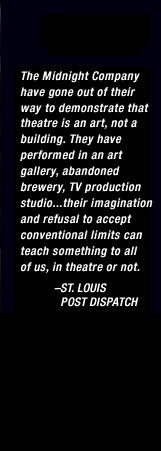How Theatre Fails St. Louis
A new show getting a lot of attention (including great audiences and reviews, a move to a bigger venue, post-show discussions involving Bright Lights of the theatre world – as well as angry emails and heated discussions around the country involving Major Players of the American regional theater) is Mike Daisey's HOW THEATER FAILED AMERICA.
(The show, which started at Joe's Pub in Manhattan, has since moved to The Barrow Street Theater, and is running til mid-June. See mikedaisey.com for more info.)
In the show, Daisey (known for his original one-man shows – particularly 21 DOG YEARS about his years involved in the Internet boom) “…makes a provocative argument about how regional theaters, in pursuit of growth, have lost sight of their original mission: They have put more money into expensive new buildings than grooming and rewarding actors; despite lip service about promoting diversity and community, artistic directors want to keep theater as a luxury item for the wealthy; the importing of actors, mainly from New York, has divorced theaters from their communities.” (NY Times)
One can imagine how quickly and viciously artistic directors strike back when attacked, and there must have been some doozies of replies to the Times summary of the show above.
You can too easily relate Daisey's comments to the St. Louis Rep, and, scaling down the size/dollars of the comments, can also relate many of those comments to many of our smaller companies. Hopefully all artistic associates at all our companies regularly stop and do an internal check of just what they're supposed to be doing, from time to time. A discussion here of Daisey's topic, involving Bright Lights and even some dim bulbs of the local theatre community would be fascinating.
But it spurred me to articulate some thoughts/feelings I've been having lately about theatre in St. Louis.
I'm not going to jump on the Rep here, or anybody, I want to be more general, but, of course, I think it's an aesthetic crime that the Rep casts so heavily from out of town, as well as a major artistic and institutional mistake that they don't employ a formal company of actors. But that's preaching to the choir.
My major focus concerns the performance of the plays we do themselves – and the experience of the audience.
A good script, good set, nice lighting, fine acting…some or all of those can be on display on stage…but that does not always equal a real, and meaningful, theatre experience.
Example. I saw THE PILLOWMAN a couple of years ago at OffRamp, from the Rep. I was looking forward to the script, and the show. I found the script to be a little over-written, at least 20 minutes too long. But, the script aside, I did not like the show because I did not relate to the actors. It was a Thursday night, maybe things were a bit off, but I watched three good actors (from somewhere out of town) doing a good job on their three roles. But as the show went on, I realized there were at least three St. Louis actors capable of playing each of those roles, and I realized I would have been a whole lot more interested in the evening if they were actors I knew.
I can't put myself into the heads of THE PILLOWMAN cast; maybe they were acting their hearts out, and giving us everything they could to carry us into their world. But I used to be on the staff at the Rep. I would watch guest actors gear their focus to guest lighting designers or guest directors, or people they could relate to from New York or wherever. Gear their focus to them more than an audience, who were, literally, strangers to them, and vice versa.
I think my key point here is not about out-of-town actors, but about playing/giving to the audience. I'm not sure the Rep's shows always play “to” the audience.
And not just the Rep. Other shows I've seen at other Companies in town: sometimes, despite good scripts, good sets, some good acting, whatever, it seems like the production wants the audience to come to them; it's like, “Here we are. Aren't we artistic? Aren't we good? Don't we deserve a Kevin Kline? You are so lucky to have us.”
Or maybe not. Maybe that's just my own theatre madness.
In any case, the word about Mike Daisey's show hit some buttons for me. Not just in the examination of big regional theatre policies. But also in the simple truth that no matter where we're working, our job is to give to, to connect with, that audience, to make sure they know they're part of all this, and we're doing it, right now, just for them. |



